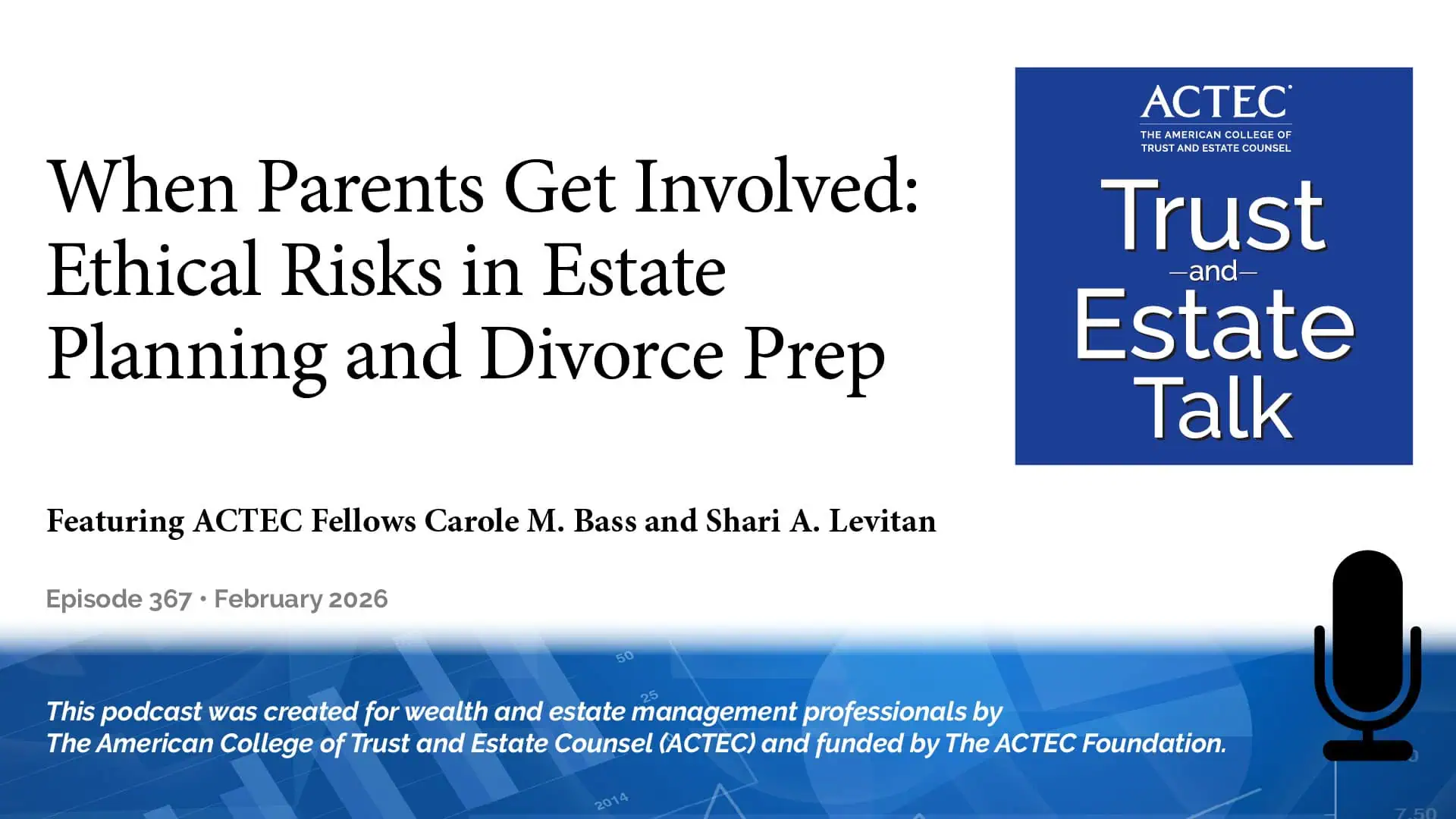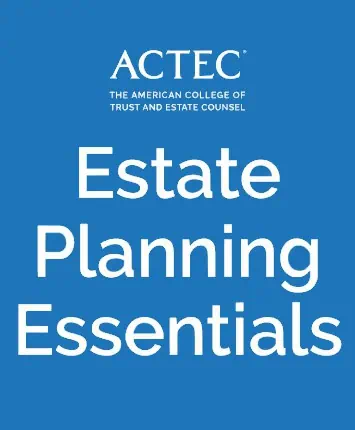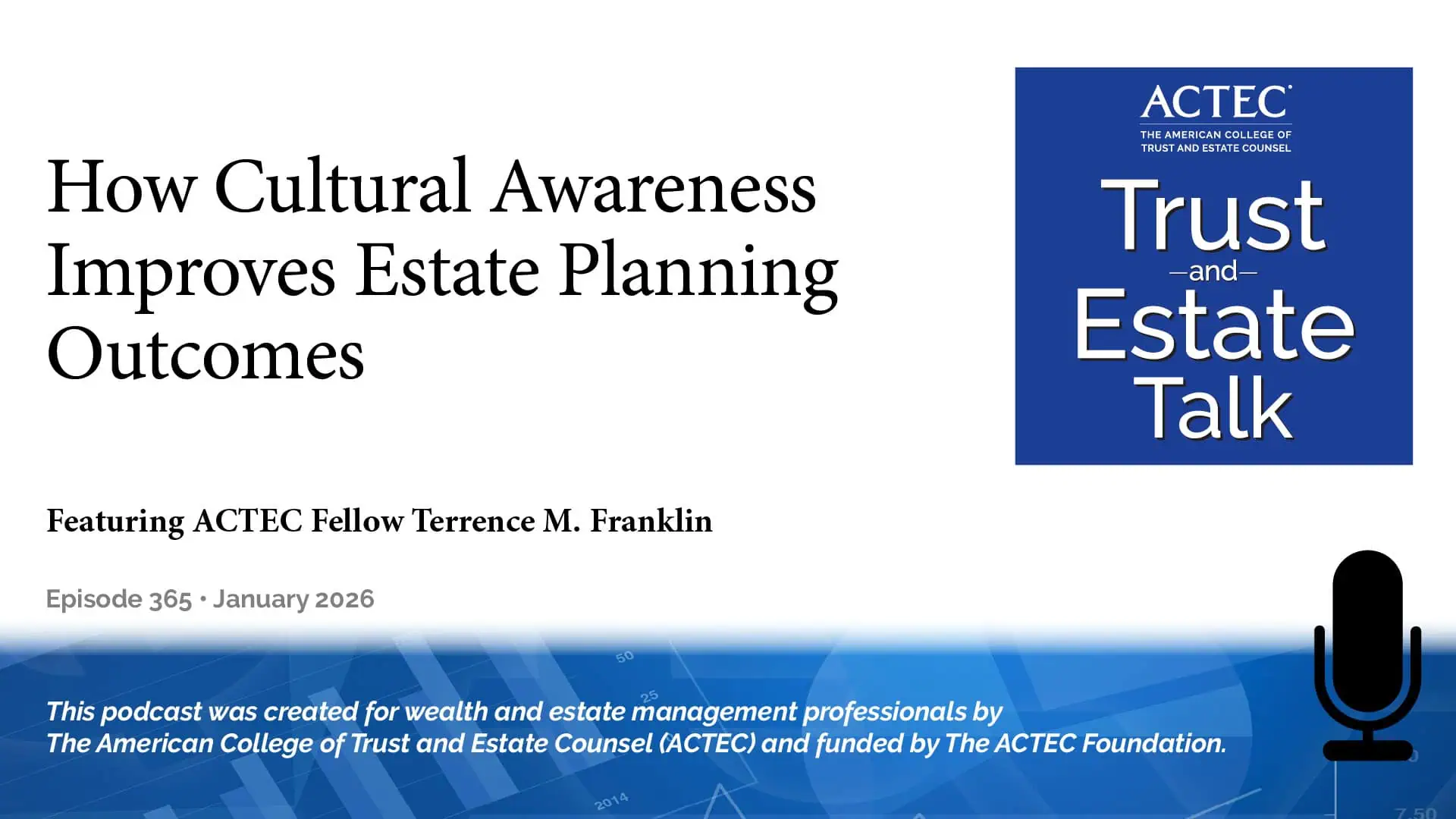The NextGen Bar Exam Threat to Wills and Trusts
“The NextGen Bar Exam Threat to Wills and Trusts” is the subject of today’s ACTEC Trust and Estate Talk.
Transcript/Show Notes
This is Deborah O. McKinnon, ACTEC’s Executive Director, and I’m joined today in the ACTEC office in Washington, DC by ACTEC Fellow and Board of Regents member Dana Fitzsimons from Atlanta, Georgia. ACTEC has urged states to reject the NextGen Bar Exam because the National Conference of Bar Examiners (NCBE), has essentially dropped wills and trusts from the exam.
So, Dana, to get us started, who is NCBE and what is the NextGen Bar Exam?
National Conference of Bar Examiners (NCBE) and the NextGen Bar Exam
Dana Fitzsimons: Thanks for having me. The NCBE (National Conference of Bar Examiners) is a corporation that develops the bar exam for admission to law practice. In almost every state you have to pass a bar exam to practice law. And it’s important to keep in mind – the purpose of the bar exam is to protect the public by making sure attorneys have the minimum skills needed by entry-level lawyers.
The NextGen Bar Exam is NCBE’s new bar exam that will replace the Uniform Bar Exam (UBE), and it’s set to roll out in 2026. It’s a major change. It moves away from memorization across multiple legal subjects, and it moves down from 12 to 9 hours. And it tests fewer subjects.
NCBE decided that lawyers aren’t likely to encounter wills and trusts in law practice and cut it from the NextGen Bar Exam. They’re wrong, and that’s what we’re talking about today. Twenty-one states have adopted the NextGen Bar Exam so far. The first wave will be in 2026. So this is a hot issue right now.
Concerns About the New NextGen Bar Exam
Deborah McKinnon: Why should the legal community and public be concerned about this NextGen Bar Exam?
Dana Fitzsimons: NCBE cut wills and trusts as foundational knowledge areas on the NextGen Bar Exam. This means you don’t need to know any wills or trusts law to pass the NextGen Bar Exam. And NCBE rejected requests by ACTEC, the National College of Probate Judges, the American Bar Association, and others to restore those subjects to the exam.
It’s a really serious problem when you stop testing basic competence in an area of law that matters to everyone.
Importance of Testing Wills and Trusts on a Bar Exam
Deborah McKinnon: Why is the testing of wills and trusts on a bar exam so important?
Dana Fitzsimons: That’s pretty simple to explain. We all need lawyers that are competent in wills and trusts. It’s one of the most universal legal needs there is. It’s personal. It’s marriage, the birth of child, the rearing and education of children, aging, sickness, incapacity, death, and grieving and recovering. It’s peace of mind at end of life, taking care of your loved ones when you’re gone, and caring for orphaned children. It impacts every ethnic, cultural, and economic walk of life.
It connects to almost every other kind of law – business planning, bankruptcy, domestic relations, and tax law. It’s preserving the family farm and business, protecting family members who are incapacitated, vulnerable, or addicted. It is giving to charity, managing retirement assets, and avoiding fights that destroy families. Not surprisingly, it’s one of the top five areas of consumer legal need. And it has to be a minimum skill we expect for all new attorneys.
So how does all this connect to the bar exam? Law students pick courses based on what’s on the bar exam. If they don’t need to take wills and trusts to pass the bar exam, most won’t take the course.
Law schools will stop hiring professors to teach those subjects. We’ll have generations of lawyers that lack basic understanding of something that impacts everyone’s lives. And students who would have developed an interest in this area of the law will simply never be exposed to it. We’ll have a lack of access to important legal services we all need. We already have a dangerous shortage of estate planning lawyers. This will make it worse. And the bar exam will have failed to protect the public.
NCBE’s Response to Concerns About Changes in the Bar Exam
Deborah McKinnon: How has NCBE responded to all these concerns so far?
Dana Fitzsimons: Not well. NCBE responded to concerns about dropping wills and trusts by saying that, from 2026 to 2028, there will be trusts and estates concepts on every NextGen exam in a performance task and maybe also in integrated question sets.
The problem is that for those parts of the exam that NCBE is leaning on, the students are told what the law is. They don’t need to learn it in law school or understand it. And even then, it’s just for two years. So, really, NCBE is not correcting its mistake. It feels to me, at least, like it’s just trying to tamp down criticism and deflect so it can keep doing what it originally planned. It’s response falls way short of what we need. Students are being told that they don’t need any prior knowledge of wills and trusts to pass the NextGen Bar Exam, and they won’t take the courses.
It’s not speculation; it’s already happening. Law schools are already tailoring their curriculum to prepare students for NCBE’s new test. If NCBE doesn’t reverse course, legal education and lawyer competence in wills and trusts are in pretty serious jeopardy. At least so far, NCBE seems okay with this.
Deborah McKinnon: This sounds like an urgent situation.
Dana Fitzsimons: If you were going to pick the absolute worst possible time to undermine wills and trusts, it would be right now. It’s what makes these actions so shocking.
The largest accumulation of wealth in the world’s history – $84 trillion dollars – is moving between generations right now, with the passing of the baby boom, silent, and greatest generations. It’s already started. It’s a tsunami of American wealth that’s in motion – and it could be destructive and wreak havoc on families and court systems if it’s not handled with competence.
On top of that, we’ve got small businesses, which are responsible for about half of all American jobs, in transition between generations, and all kinds of new assets like cryptocurrency to deal with.
We’ve got incredible volatility in the estate and gift tax system, and not enough lawyers to help families navigate those law changes and plan for the care of their families and the future of their businesses.
We’ve got Americans trying to give back – almost $500 billion a year in American charitable giving – and they need help so they can keep helping the neediest and most vulnerable folks here and across the world.
And our probate courts are in desperate need of skilled estate and trust lawyers. More than a million probate and estate cases are filed in state courts every year. This is going to skyrocket with the “silver tsunami” as the baby boomers die, and it’s no surprise that the National College of Probate Judges asked NCBE to keep wills and trusts on the bar exam. But that seems to have fallen on deaf ears so far.
It’s worth noting that wills and probate are consistently among the top areas where clients file attorney malpractice claims. We need to be improving competence in these areas right now – not gutting them by stripping them from the bar exam. These are the legal services people need and use. That’s just going to keep increasing, and lawyers have to know what they’re talking about.
Impact of Changes in the Bar Exam on Families
Deborah McKinnon: Dana, is this just a problem for wealthy families?
Dana Fitzsimons: Absolutely not. This is everyone. This is about rural communities with a severe lack of estate planning services that live in what’s called “legal deserts.” This is about protecting and passing on people’s biggest asset, their home.
This is about aging with dignity and safety. This is about protecting the more than 60 million Americans, 18% of the nation’s population, who are living with a disability and who need help with decision making and getting access to care.
This is about reducing the wealth gap for Black and Hispanic families. There’s a racial gap in inheritances and the ability for families to build up wealth and economic power. Lack of access to estate planning aggravates systemic racial inequity. We need a lot more estate planning competence in Black and Hispanic communities.
It’s for parents having children with reproductive technology. It’s about facilitating the building of the modern American family in all its new forms and supporting the LGBTQ+ community. It’s not a “them versus us” issue that people can choose to ignore. It’s just us. It’s all of us together.
Deborah McKinnon: Are there people that ACTEC is especially concerned about being hurt by the NextGen Bar Exam?
Dana Fitzsimons: We’re worried about seniors. There are about 55 million older Americans, and soon it will be 22% of the population. Alzheimer’s will affect 18 million people by 2050 and, at least for now, there’s no cure. They need access to lifesaving government benefits and need to be protected from the societal epidemic of elder financial abuse.
Competence in wills and trusts is essential in helping clients navigate the intersection of aging, disability, the risk of financial exploitation, public benefits, and the needs of vulnerable citizens. Over 10% of elder Americans experience abuse each year. Older adults in the U.S. lose billions of dollars every year to financial exploitation. Elder abuse is dramatically underreported, with 43 unreported cases for every case that is reported. And the severe financial loss is not the only harm done, with exploitation increasing premature deaths in the elderly by 300%. I think it’s unconscionable to say we don’t need lawyers who have basic competence to protect our seniors.
Deborah McKinnon: Who else besides ACTEC should be worried about NCBE’s actions?
Dana Fitzsimons: Again, it’s all of us. I think bar organizations, state supreme courts, probate judges, bar examiners, and law schools should be concerned, for sure. Anyone that serves elder populations, communities of color, and people with disabilities should be concerned and get involved.
The entire financial services industry would be right to be concerned – both about the possible loss of American wealth and the lack of talent to hire from. I think legal malpractice carriers would be impacted. And certainly, anyone concerned with protecting our citizens from financial predators. But again, it’s really all of us together that are being harmed.
Take Action and Let NCBE Know Your Concerns About the NextGen Bar Exam
Deborah McKinnon: Is it too late to do anything about it?
Dana Fitzsimons: Not at all. But the time to act is now. The test is still under development, and we know that NCBE can change its course. It was going to cut family law too, but then changed its mind and will bring it back in 2028.
We can expect this exam to be around for a while, so it’s never too late for NCBE to do the right thing. And states are NCBE’s customers. If they demand the change to the exam to bring back wills and trusts (and they should), I would hope NCBE would respond to that demand. Otherwise, NCBE would fail to get and keep its customers.
Deborah McKinnon: What can the public, professionals, and interested organizations do now, if they want to help restore wills and trusts to the NextGen Bar Exam?
Dana Fitzsimons: Write and call NCBE and its leaders. Their website is ncbex.org.
Contact your state board of bar examiners. Contact your state supreme court. And encourage others to do the same. It’s going to take everyone pushing together to get the change we all need.
Deborah McKinnon: Any final thoughts before we wrap up today?
Dana Fitzsimons: First, thanks for having me here to have this important discussion. This is really important, it’s happening right now, and it’s happening to all of us. We all need the bar exam to ensure lawyers have basic competence in wills and trusts to protect the public, including some of its most vulnerable people. To protect homes and businesses, farms and wealth. To foster a diverse and inclusive society. To support charities, and to ensure access to justice.
We shouldn’t lose access to the legal services we need the most for real life. So, we need to do, together, whatever we can so that states draw a hard line and reject the NextGen Bar Exam until NCBE restores wills and trusts as foundational knowledge areas. Or if they are already customers of the NextGen Bar Exam, demand that the test be changed.
Deborah McKinnon: Dana, thank you for your time and insight today. To learn more about this critical issue, please visit the ACTEC website at actec.org/nextgenbarexam.
Latest ACTEC Trust and Estate Talk Podcasts

Estate Planning Considerations in Community Property States Relating to Retirement Accounts
Explore how community property laws shape IRAs, 401(k)s, beneficiary designations, and spousal rights in retirement account estate planning.

When Parents Get Involved: Ethical Risks in Estate Planning and Divorce Prep
When parents join prenup or divorce planning, ethical risks follow. ACTEC Fellows explore privilege, conflicts, and protecting the attorney-client relationship.

Useful But Overlooked Trusts: A Planner’s Guide to When and How to Use Them
Explore overlooked trusts—including HEETs, alimony, voting, and blind trusts—and when estate planners should use them to address complex client needs.



